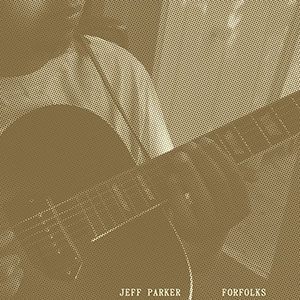
Jeff Parker can play. He’s collaborated with many contemporary jazz greats and musicians on the pop and indie scene: from Brian Blade to Bill Callahan and most notably as a member of the Chicago post-rock titan Tortoise.
Whomever Parker is with – as a sideman, session musician, founder, or leader – he’s always an integral part of that company. Parker can adopt the colors and tap into the ambiance of the company he’s in. This relational talent is evident in his approach to composing music as well. Parker combines improvisation with samples and old programmed beats and relates all these elements. This approach came to full fruition on Parker’s last album, the beautiful Suite for Max Brown (2020).
Forfolks takes a different route, and it isn’t a collaborative effort. It’s just Parker with his guitar, loop pedals, and keyboard synths. It’s a solo affair, but it evokes so much more. The New Breed (2016) was a tribute to Parker’s late father, and Suite for Max Brown was dedicated to his mother. Forfolks continues this trend but takes on a universal approach. Forfolks is comprised of eight songs. Old tunes and new ones and jazz standards thrive in a balance, referencing and commenting on each other. Musical and family ancestry flow together. Here each exists because of the other.
Thelonious Monk shows up in the shape of “Ugly Beauty”, and Whiting’s evergreen “My Ideal” is taken on, too. Fusing jazz standards with novel compositions is the established mold of the jazz album, but on Forfolks, this serves the motifs perfectly. Ancestry and ancestorship are the themes that travel throughout this set of tunes. In Danish, ancestors are called “forfædre”, and it’s “vorfahren” in the German language. Forfolks is ripe with allusions to ancestry on many levels.
Band constellations are often called family because their intimacy and shared cocreation create similar ties. In a band – as in a family – the different points of view each member brings to the table form the standard narrative. In Tortoise, they incessantly swap instruments, share and explore ideas and take them to other constellations where new elements are either added or discarded. It’s always a sum of the individual parts, and great ideas are constantly passed around. Old? New? Yours or mine? Music travels free here; there’s no ownership, and there’s only devotion and obligation to let the music evolve – to pass it on.
Forfolks closes with the old tune “La Jetée”, but that tune essentially opens up the album retrospectively. Recorded with Isotope 217 on The Unstable Molecule (1997) and later for the seminal Tortoise album TNT (1998), Parker’s first outing with the band. The Tortoise version (renamed and translated into “Jetty”) is a ferocious, fast-paced beast with a robotic beat and a bleeding heart at its core: a melody line that holds the piece together and allows it to go anywhere it pleases. Here on Forfolks, Parker peels off all the layers of its previous incarnations. Gone are the horns and lounge jazz vibe from the Isotope 217 version, and the frenetic jitter from the TNT composition is turned off. That leaves just the melody distilled – clear, fragile, and beautiful. The other performances still echo in your head, but this only makes that memorable melody line even more haunting.
La Jetée is also an influential experimental avant-garde film from 1962 by French filmmaker Chris Marker and undoubtedly the song’s origins and reference point. The film is 28 minutes long, deals with time travel experiments in a post-nuclear Paris, and is composed entirely of still shots. Terry Gilliam’s modern sci-fi classic 12 Monkeys (1995) is one extended homage to this early 1960s gem. Central to La Jetée are its musings on temporality and mortality. Because it’s constructed out of stills, the perceived movement is an illusion as it is with all moving pictures. Therefore music takes center stage and becomes the editing framework. It provides rhythm to the stills and relates the separate images. Music is the narrative glue.
“La Jetée” encapsulates Parker’s approach and the motifs on Forfolks and becomes a kind of microcosmos of the album in the process. The album is scattered with melody and melodic fragments that, like stills, bridge the gaps. Voices emerge and are looped, creating a tapestry of sound and broom with life. The album becomes a conversation and you, as a listener, have your part to play in this, too. “Off Om”, “Four Folks”, and “Excess Success” all take this approach to beautiful results. Especially the album highlight “Suffolk” is a perfect showcase of Parker’s gift. There’s beauty there and melody, no matter how well it’s under a guise or chopped up.
Forfolks is Jeff Parker on his own, but it’s a selfless statement. Here the music, like life, thrives in collaboration, and context is everything. On Forfolks, the music is a shared consciousness that keeps expanding long after its closing notes. Like the unfolding of the ancestry tree. You are not on your own, and music is never yours, alone.


![Call for Papers: All Things Reconsidered [MUSIC] May-August 2024](https://www.popmatters.com/wp-content/uploads/2024/04/all-things-reconsidered-call-music-may-2024-720x380.jpg)



